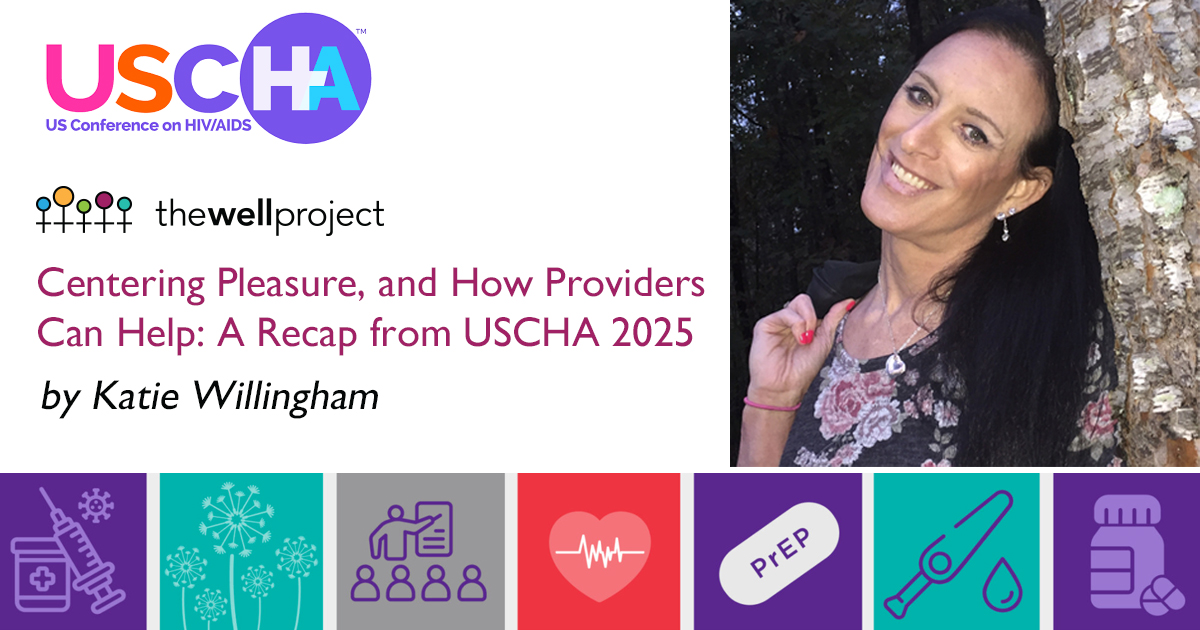
By Katie Willingham
Amid turmoil and uncertainty in Washington, DC, and across the United States, this year's US Conference on HIV/AIDS (USCHA 2025) descended yet again on the nation's capital from September 4 – 7. The theme of the gathering was Aging with HIV, and all sessions incorporated that crucial lens in some way. Members of The Well Project's community were involved in the conference on various levels, reporting on as well as presenting at the nation's largest HIV community meeting.
"Facilitating Engagement Between Women and Providers About Sex and Pleasure" was a great panel discussion with The Well Project, represented by Olivia Ford, Bridgette Picou, Tiommi Luckett, and Tonia Poteat. The Well Project is a nonprofit, online organization dedicated to providing resources and community to women living with HIV from across the gender spectrum. Leveraging technology to improve health outcomes and increase the quality of life for women and girls living with HIV. The focus of The Well Project is to provide education and information, community support, advocacy and leadership development, collaborative engagement, and research that focuses on improving the lives of women.
The Well Project is proud to be a resource that focuses on women from across the gender spectrum, meaning all women who identify as women are welcomed, supported, and respected; however, anyone who can benefit from the resources provided are welcome. The Well Project not only acknowledges and affirms women of transgender and non-binary experience, but also celebrates their existence. The organization is very intentional about the language they use on their website and in their programs reflecting that affirmation, and they commit themselves to growing and improving this practice and becoming more inclusive in their language.
Olivia spoke about one of the programs that The Well Project offers called SHE/HER/THEY which is actually an acronym that stands for Sexual Health Education/HIV Empowerment Resources/Treating HIV Equally. This program is an educational outreach initiative focused on enhancing engagement to care, positive health outcomes, and overall wellbeing of women and girls living with or vulnerable to HIV across the gender spectrum. This approach includes promoting a holistic and non-stigmatizing approach to wellness, integrating sexual and reproductive health – this includes sex positivity and pleasure – within HIV prevention and care efforts. The program centers the experiences of Black women and other women of color, encouraging comprehensive, culturally responsive healthcare that addresses and supports the whole woman, and reframing "risk" to focus on HIV relevance and reasons for prevention, while consistently incorporating U=U messaging.
The Well Project believes that all women living with HIV across the gender spectrum deserve to live a fulfilling and satisfying sexual life, and encourages women to talk about sex and pleasure with their healthcare provider. Why not? Pleasure is a basic human right and should be treated as such. The principles of pleasure that The Well Project seeks to embody in their work are: celebrating sexuality, prioritizing and centering one's needs, and asserting bodily autonomy to encourage women to love themselves, embrace learning, and enjoy a healthy sex life.
Pleasure not only feels good but is also very healthy for you, mentally, emotionally as well as physically. Lowering stress, promoting better sleep, and increasing oxytocin levels (the pleasure or "love" hormone) which can also be healing. Having pleasurable, safe sexual experiences has been identified by the World Health Organization and other bodies as a central aspect of health and wellbeing.
However, there exist barriers to pleasure in healthcare, and a total absence of the notion of pleasure as related to sexual health throughout the U.S. healthcare system, as well as the bifurcation of sexual health and HIV care. These barriers to reaching, serving, and supporting women living with HIV are infuriating, and on top, also may hold (perhaps unconsciously) bias or discomfort about older people and their sexuality. More research is definitely needed about sexual pleasure in women living with HIV.
So what can providers do to help? They can start by normalizing sexual health services in HIV care, equipping themselves to talk about pleasure and HIV prevention with women of all ages as part of their overall wellness and positively position sex and Center sexual pleasure in proactive and non-judgmental discussions. This builds trust between women and their providers.
I came away from this with a different perspective about pleasure as a healthcare tool, healing physical and emotional health in women one orgasm at a time, so to speak. I can only imagine how women have survived for so long as sexual pleasure has been stigmatized by so many people for centuries. A woman's pleasure and satisfaction has not always been a priority to men; in fact it rarely is. But sexual pleasure really is healthy; we know that doctors used to treat women with anxiety, depression, or other mental health issues with a vibrator to accomplish orgasm as treatment. And it worked. Still can.
More from The Well Project on the 2025 United States Conference on HIV/AIDS (USCHA 2025)
The 2025 U.S. Conference on HIV and AIDS | On The Ground by KatieAdsila on A Girl Like Me
Building Community in a Harsh Political Climate: A Recap from USCHA 2025
Crafting Tools to Communicate HIV Care Gaps: A Recap from USCHA 2025
Understanding the Burden of Survival for Women: A Recap from USCHA 2025




